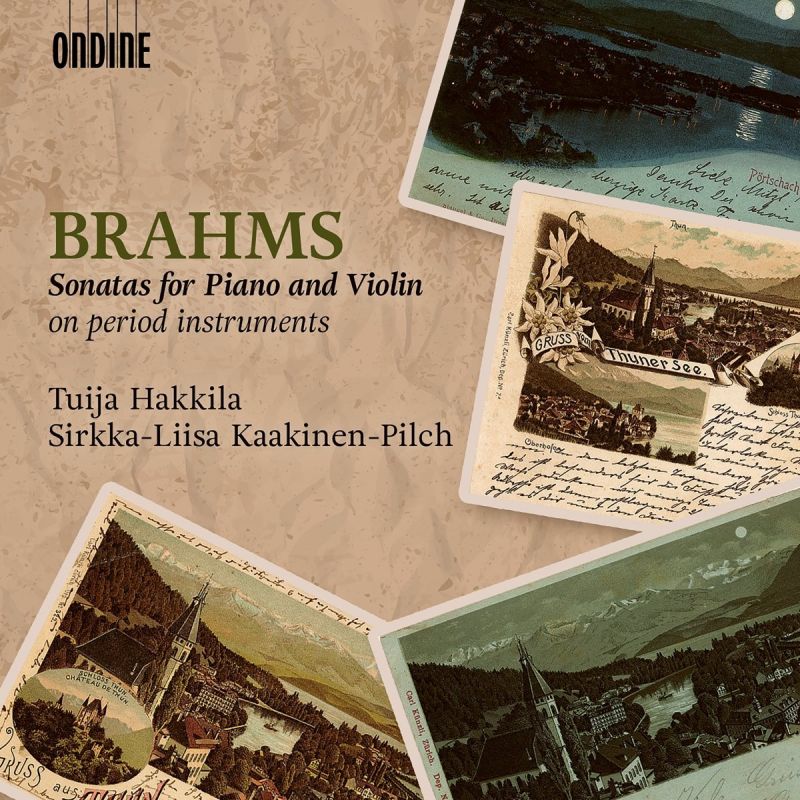BRAHMS Violin Sonatas (Kaakinen-Pilch, Hakkila)
View record and artist detailsRecord and Artist Details
Composer or Director: Johannes Brahms
Genre:
Chamber
Label: Ondine
Magazine Review Date: 07/2018
Media Format: CD or Download
Media Runtime: 75
Mastering:
DDD
Catalogue Number: ODE1315-2

Tracks:
| Composition | Artist Credit |
|---|---|
| (5) Lieder, Movement: No. 4, Auf dem Kirchhofe (wds. Liliencron) |
Johannes Brahms, Composer
Johannes Brahms, Composer Sirkka-Liisa Kaakinen-Pilch, Violin Tuija Hakkila, Piano |
| Sonata for Violin and Piano No. 2 |
Johannes Brahms, Composer
Johannes Brahms, Composer Sirkka-Liisa Kaakinen-Pilch, Violin Tuija Hakkila, Piano |
| (5) Lieder, Movement: No. 1, Wie Melodien zieht es mir (wds. Groth) |
Johannes Brahms, Composer
Johannes Brahms, Composer Sirkka-Liisa Kaakinen-Pilch, Violin Tuija Hakkila, Piano |
| Sonata for Violin and Piano No. 3 |
Johannes Brahms, Composer
Johannes Brahms, Composer Sirkka-Liisa Kaakinen-Pilch, Violin Tuija Hakkila, Piano |
| (8) Lieder, Movement: No. 3, Regenlied (wds. Groth) |
Johannes Brahms, Composer
Johannes Brahms, Composer Sirkka-Liisa Kaakinen-Pilch, Violin Tuija Hakkila, Piano |
| Sonata for Violin and Piano No. 1 |
Johannes Brahms, Composer
Johannes Brahms, Composer Sirkka-Liisa Kaakinen-Pilch, Violin Tuija Hakkila, Piano |
Author: Andrew Farach-Colton
I have mixed feelings about Kaakinen-Pilch’s tone, which tends towards the wiry. There’s a fineness to it that’s attractive in its focus and suggestion of vulnerability but at times I simply wanted more richness. The return of the first theme in the Andante of Op 100 (at 5'00"), for example, feels precariously fragile, not the consolatory dolce Brahms asks for. On the other hand, she plays the Adagio of Op 108 with a lovely singing tone – similar, in fact, to the expressively articulate way she plays the arrangements of the three song arrangements that are musically connected with the sonatas. Her double-stops are particularly eloquent. Listen at 4'08" in the opening movement of Op 78, where they’re like heartfelt pangs.
Hakkila is a marvellous Brahmsian, although she eschews the traditional hearty style that reminds us of the burly, bearded fellow in photographs. Instead, her light touch and pliable, long-breathed phrasing give the music unusual fluidity and buoyancy. I’m enthralled by the rhythmic springiness she brings to the normally weighty passage at 3'06" in the first movement of Op 100, and the breathless, feathery quality of her playing at 1'50" in that sonata’s finale. She uses two instruments: an exquisitely mellow 1864 Streicher for Op 78 and a more resonant 1892 Bösendorfer for the later works (Korol uses a Streicher and Melnikov a Bösendorfer for all three).
Whatever slight misgivings I have about the violin’s tone, I have none about this partnership. The intensely intimate atmosphere of this recording is due in large part to Kaakinen-Pilch and Hakkila’s ability to breathe and move together. Theirs is a refreshing, unified view of these sonatas, and one I expect to return to again with grateful pleasure.
Discover the world's largest classical music catalogue with Presto Music.

Gramophone Digital Club
- Digital Edition
- Digital Archive
- Reviews Database
- Full website access
From £8.75 / month
Subscribe
Gramophone Full Club
- Print Edition
- Digital Edition
- Digital Archive
- Reviews Database
- Full website access
From £11.00 / month
Subscribe
If you are a library, university or other organisation that would be interested in an institutional subscription to Gramophone please click here for further information.




